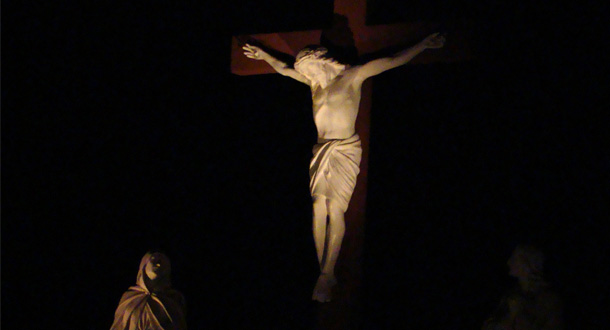Memorial of the Blessed Virgin Mary, Mother of the Church
Scripture:
Genesis 3:9-15, 20 or Acts 1:12-14
John 19:25-34
Reflection:
No One Goes to Church to Feel Bad

As we honor Mary, Mother of the Church today, we first see Eve in the Garden. Julien of Norwich says that, “when Adam fell, Jesus fell into the womb of Mary.” The Incarnation is joined to the Paschal Mystery.
The word of Jesus spoken in his suffering to his mother and disciple, John, “Behold”,
invites us to quiet consideration, mysticism. What do we ‘behold’ in this mother, and John the disciple? Mary, chosen by God, a woman without sin, opened her being to God’s will with her “Yes”. On Calvary, she shares the Paschal Mystery of her son. Now her broken heart’s gift is openness to the Father’s will as she abandons herself to God, as does her son. Behold John, a man who has not abandoned his friend’s mother. Jesus knows John’s love and can place his mother in his care.
In the days that follow, we see the fragile, early Church awaiting the gift Jesus told them they would receive. The disciples from Galilee who followed Jesus from the beginning Mary knew as Jesus’ friends. They had worked with him and cared for him. Now they are a group of confused and broken, doubtful and afraid men and women, gathered behind locked doors. During these birth pains, Mary must have been a quiet strength, a coach, as she beholds what God is birthing, the fulfillment of Ezekiel’s prophecy, “You will be my people and I will be your God”.
Pope Francis offered a prayer during Easter week a few years ago. He describes Jesus kneeling before the Father, showing his wounds. At his side stands Mary. The Holy Spirit is present. Jesus says to the Father, “Father, remember how much we love them”. A beautiful prayer for the Church. St. John Chrysostom describes the Church as having a table bowed down with the abundance of God’s love. That table must be the altar. The weight of the Body and Blood on the altar would seem very light; how could it bow down the altar? However, we are what we receive; we are one with Jesus in the sharing of the Eucharist, for we are His body. We can see ourselves symbolically upon the altar, our weight, the weight of the Body of Christ, the Church, that bows down at the table of the Eucharist. In each of the Eucharistic prayers, there is a part called the intercessions. In these intercessions we hear the burdens of one another, the Church, brought through our prayer and laid upon the altar:.…for our beloved dead, the needs of the Church and those who serve, for those we do not love as we should, for healing and conversion, that we may share the joys and sorrows, the hopes and fears of our brother and sisters, for the hope of a world made new…
This is the Church, the Body of Christ, of whom Mary is the Mother. She nourished Jesus, she nourishes us and enables us to nourish our brothers and sisters with the abundance of God’s love that is our food in the Eucharist. None of us go to Church to feel bad…all of us have cried and reached out our arms and run to our mothers for their comfort. Mary as Mother of the Church embraces us and tells us we are chosen. God’s love is ours. Like Jesus’ first friends, we learn to share that gift. May Mary, with her mother’s love for us, help us on our journey and nurture us to share God’s love until our welcome home to the fullness of the banquet table of heaven.
Fr. William Murphy, CP is a member of Immaculate Conception Community in Jamaica, New York.







